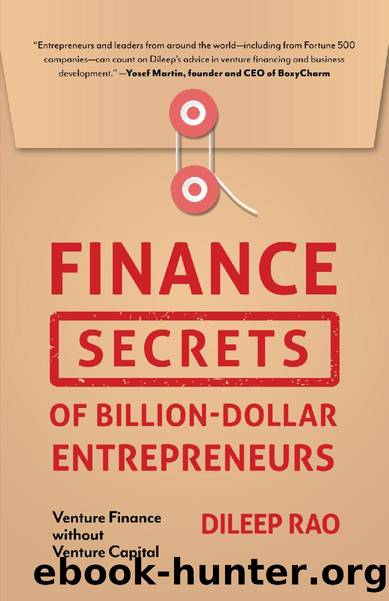Finance Secrets of Billion-Dollar Entrepreneurs by Dileep Rao

Author:Dileep Rao [Rao, Dileep]
Language: eng
Format: epub
ISBN: 9781642502008
Publisher: Mango Media
Published: 2020-10-20T03:02:05+00:00
Chapter 12
Choose Smarter Instruments
The US has more diverse financial instruments for venture development than nearly any other country in the world. Use the instruments that help you grow, stay in control, reduce risk for financiers, and reduce dilution for you.
Financial instruments include equity, hybrid, debt, and leasing instruments, and each has its own use, cost, risk, and method of repayment. The right financial instruments can better align entrepreneursâ and financiersâ interests to reach agreement.
The types of financial instruments you use and their terms should be matched with the company, the type of asset, cash flow available, risk, payback term, cost, and covenants. Matching correctly can lower the risk and cost of financing.33
Equity and Hybrid Instruments
Equity and hybrid instruments include common stock, preferred stock (mainly convertible), convertible debt, warrants, franchising a way to get equity, and employee stock-ownership trusts. Equity and hybrid instruments require a share of the company in the form of immediate ownership or the right to buy shares in the future. These instruments carry the highest risk for investors and are the most expensive for entrepreneurs in terms of dilution and risk of losing control. Their advantage is that they reduce the risk and cost of bankruptcy.
The following instruments can help you finance your business and stay in control; however, some of these instruments can have clauses that give financiers control under certain circumstances.
Non-Controlling Common Shares
This strategy could include sales of a minority share of the company, shares without voting rights, or fewer voting rights than other shares of common stock sold to insiders. In early rounds, non-controlling common shares are often sold to family, friends, small angels, and unsophisticated investors. When sophisticated investors consider common stock, they will usually ask for rights to control and take over the company if the business is in trouble or has not met its goals.
Mark Zuckerberg of Facebook, and Larry Page and Sergey Brin of Google were able to get sophisticated angels to invest significant amounts of funding that still allowed the entrepreneurs to stay in control of the company. Zuckerberg, Page, and Brin stayed in control of their ventures since they had already developed the technology and the momentum in order to dominate an attractive, emerging, high-potential industry.
Preferred Stock
Preferred stock, as used in venture financing, is convertible to common stock and is used along with common stock or subordinated convertible debt to fund new ventures. VC funds normally use preferred stock when making investments since it allows VCs to have a priority over the common shareholders in liquidation and dividends, offers convertibility if there is an upside, and offers clauses to control the venture and protect VC interests that may not be available to common shareholders. They are usually able to get these rights due to their ability to invest larger amounts of funding needed by capital-intensive, high-growth ventures. When used in larger corporations such as utilities, preferred stock is often closer to high-risk bonds in its financial profile, i.e. it offers a dividend but without convertibility to common. Normally,
Download
This site does not store any files on its server. We only index and link to content provided by other sites. Please contact the content providers to delete copyright contents if any and email us, we'll remove relevant links or contents immediately.
| Private Equity | Valuation |
| Venture Capital |
The Black Swan by Nassim Nicholas Taleb(7088)
Bad Blood by John Carreyrou(6601)
Pioneering Portfolio Management by David F. Swensen(6275)
Millionaire: The Philanderer, Gambler, and Duelist Who Invented Modern Finance by Janet Gleeson(4448)
Skin in the Game by Nassim Nicholas Taleb(4224)
The Money Culture by Michael Lewis(4174)
Bullshit Jobs by David Graeber(4162)
Skin in the Game: Hidden Asymmetries in Daily Life by Nassim Nicholas Taleb(3973)
The Wisdom of Finance by Mihir Desai(3720)
Blockchain Basics by Daniel Drescher(3565)
Liar's Poker by Michael Lewis(3433)
Fooled by Randomness: The Hidden Role of Chance in Life and in the Markets by Nassim Nicholas Taleb(3091)
Hands-On Machine Learning for Algorithmic Trading by Stefan Jansen(3062)
The Intelligent Investor by Benjamin Graham Jason Zweig(3031)
Mastering Bitcoin: Programming the Open Blockchain by Andreas M. Antonopoulos(3029)
The Power of Broke by Daymond John(2953)
Investing For Dummies by Eric Tyson(2931)
You Are What You Risk by Michele Wucker(2688)
Market Wizards by Jack D. Schwager(2685)
